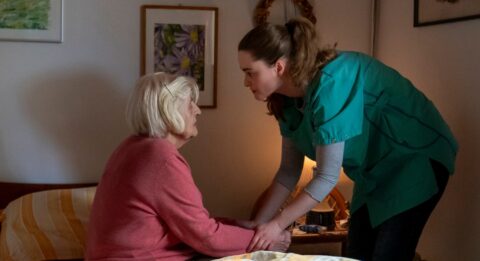A careful character study about getting lost in your work, Home Sweet Home (Frelle Petersen, 2025) follows Sofie as she pursues a new career in doing home caregiving visits for the elderly. Her initial enthusiasm quickly fades and the toll becomes visible — not just in her demeanor but in her appearance. Her skin grows pale, dark circles form under her eyes, and before long, she looks like someone who could use a caregiver herself. Recently divorced, she also begins pushing her daughter away, to the point where the girl prefers staying with her father and his new partner.
This film marks the fourth collaboration with actress Jette Søndergård and much like their 2019 film, Uncle, it focusses on the quiet sacrifices a woman makes in her devotion to caring for others.
Sofie’s more seasoned coworkers seem to have figured out how to separate their emotions from the job, but she struggles to do the same. The emotional toll intensifies as a client’s daughter escalates her abuse, even filing a false complaint, while a neglectful coworker routinely leaves patients in soiled clothes, forcing Sofie to pick up the slack.
At first, Petersen’s depiction of caregiving feels repetitive — Sofie visits the same few clients, performing the same routines: cleaning, tending to bedsores, changing soiled sheets and enduring constant abuse from one client’s daughter. But as the film progresses, it becomes clear what Petersen is emphasising — this isn’t just demanding work; it’s relentless and exhausting, not a job most people could sustain for a lifetime.
Like Canadian director Heather Young’s terrific second feature There, There (2024) and other recent caergiver films like last year’s Venice multi-prize winner Familiar Touch (Sarah Friedland, 2024), Home Sweet Home gently highlights the importance of companionship for the elderly. One of Sofie’s more affable clients — a charming man who loves chatting about what’s on TV (like Léon: The Professional [Luc Besson, 1994]) — notices her growing exhaustion. As her warmth fades, he’s briefly left with a burned-out, disengaged caregiver, and the shift in her energy inevitably dampens his own usually bright spirit.
Home Sweet Home also lightly criticises the challenges of a one-size-fits-all approach to caregiving. While these companies generally have their patients’ best interests at heart, strict policies often clash with the basic human instinct to provide simple, compassionate care. Sofie and her colleagues constantly find themselves up against rules that, while meant to ensure safety, sometimes do more harm than good. For example, caregivers aren’t allowed to use the stove or really cook for the old folks, and there’s an odd rule about bed guards — in one case, that very rule ends up causing a client serious harm.
As in Uncle, Petersen takes a quiet, observational approach, studying a wounded soul whose selflessness may come at the cost of her own happiness. Both films subtly build toward emotional payoffs without spoonfeeding their themes or resorting to cheap sentimentality.
Home Sweet Home leaves us with truths we already know but too often forget: healthcare workers are burning out at alarming rates. The elderly deserve dignity and care that sees them as individuals, not just patients. And without balance between work and home, real happiness slips further out of reach.
Editor-at-large Jared loves movies and lives with Kiki in Berlin.





